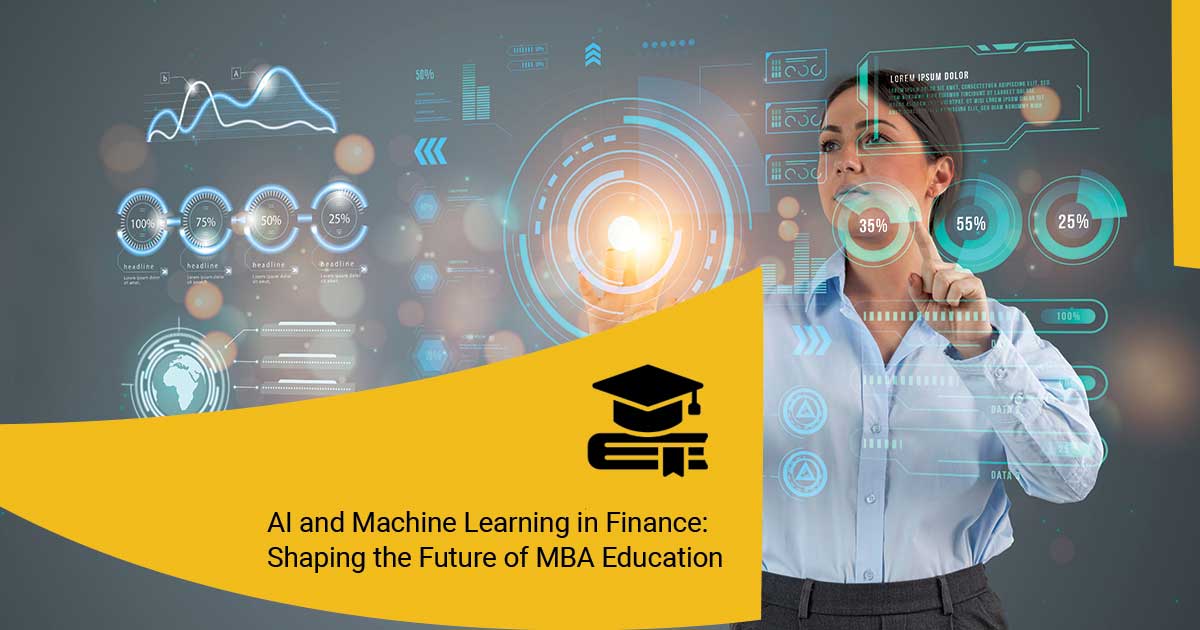AI and Machine Learning in Finance: Shaping the Future of MBA Education
04 Sep 2023

Through a successful transition from paper currency to E-Rupee, mobile banking, and credit cards, the Unified Payments Interface (UPI), digitalisation has taken over the world of finance. As the world is experiencing tech growth at a rapid pace, we cannot neglect the impact of AI and machine learning in the field of finance.
The integration of AI and machine learning in the finance sector has reinvented the way businesses operate these days. Moreover, the increasing popularity of AI and machine learning in the Masters in Business Administration (MBA) curriculum, is also clearly visible. Before we go ahead to understand how AI and machine learning are shaping the future of MBA education, let us understand the implementation of AI and machine learning in the finance sector:
Impact of AI and machine learning on the finance industry
We have listed some of the massive impacts of AI and machine learning in the finance industry. Read on.
Risk management, pricing, and pattern recognition
Pricing, risk management, and pattern recognition are algorithms and models that help forecast the prices of securities under various conditions of risk and uncertainty. Several banks are implementing machine learning algorithms to price structured products and manage risks since these models can perform these tasks better than manual intervention.
Credit scoring and fraud detection
Different bond rating firms are using machine learning algorithms to assess the firms’ capacity to meet their obligations. These companies are also using these algorithms to suggest corrective actions once they detect significant changes in the credit scores of debt issuers. Besides this, numerous banks and credit firms are also utilising machine learning algorithms to detect potential fraudulent transactions and bring them to the attention of their end customers.
Effective customer service through Chatbots
Many finance firms are deploying virtual chatbots to eliminate wait times and improve customer satisfaction. For example, banks are using these AI-driven chatbots to check account balances, transfer money, set up secure payments, and provide other automated assistance. Moreover, these chatbots reduce human dependency on non-trivial issues and allow agents to handle more complex customer needs, resulting in better customer satisfaction.
How are AI and machine learning shaping the future of MBA education?
We have a preconceived belief that AI and machine learning will become a threat to the existing workforce at the organisations. However, we must understand that AI and machine learning will help us simplify our jobs and make us more productive and effective at work. This intervention is also visible in MBA education, where the students have to learn about AI and machine learning to secure high-paying jobs in their relevant industry. Let us see how AI and machine learning can leave an impact on the MBA education:
Improvement of Quantitative Skills
As AI and machine learning have become integral to finance, MBA curricula are incorporating more quantitative skills training. The curriculum includes finance concepts backed up by machine learning algorithms such as algorithmic trading, risk assessment using predictive models, and portfolio optimisation techniques.
Industry Relevance
As already discussed above, the finance industry is rapidly adopting AI for tasks such as fraud detection, algorithmic trading, credit risk assessment, and customer service. To stay industry-relevant, MBA programmes are revising their courses to reflect these industry trends, ensuring that students are equipped with skills relevant to the evolving job market.
Specialised Courses
Due to the huge market demand, AI and machine learning are now adapted as specialised courses within MBA programmes. These specific courses focus on topics like financial technology (FinTech), robotic advisors, blockchain, and the ethical considerations of using AI in finance. By opting for these specialisations, students can explore niche areas that align with their career interests.
Practical Experience
Several reputed business schools are offering MBA programmes that incorporate hands-on projects involving real-world financial data and AI tools. Through active involvement in these projects, students gain practical experience in applying AI and machine learning techniques. With the help of this practical exposure, students can solve finance-related problems, making them job-ready upon graduation.
Way Forward
In our rapidly evolving world, the fusion of AI and machine learning has brought about a significant shift in the finance industry. However, the role of AI is not just limited to empowering the finance sector but also revolutionising MBA education. AI's influence on risk management, credit scoring, and customer service echoes in MBA curricula, thereby enriching quantitative skills with algorithmic insights. This synergy with real-world finance trends keeps education relevant and impactful. Through specialised courses and hands-on projects, students are empowered to shape the future, bridging the gap between classrooms and the ever-evolving world of finance and technology. In conclusion, the journey from paper currency to AI-driven finance signifies an era of transformation for the future professionals of the country!
Recent Blogs
06 Jan 2025
13 Jan 2025
20 Jan 2025